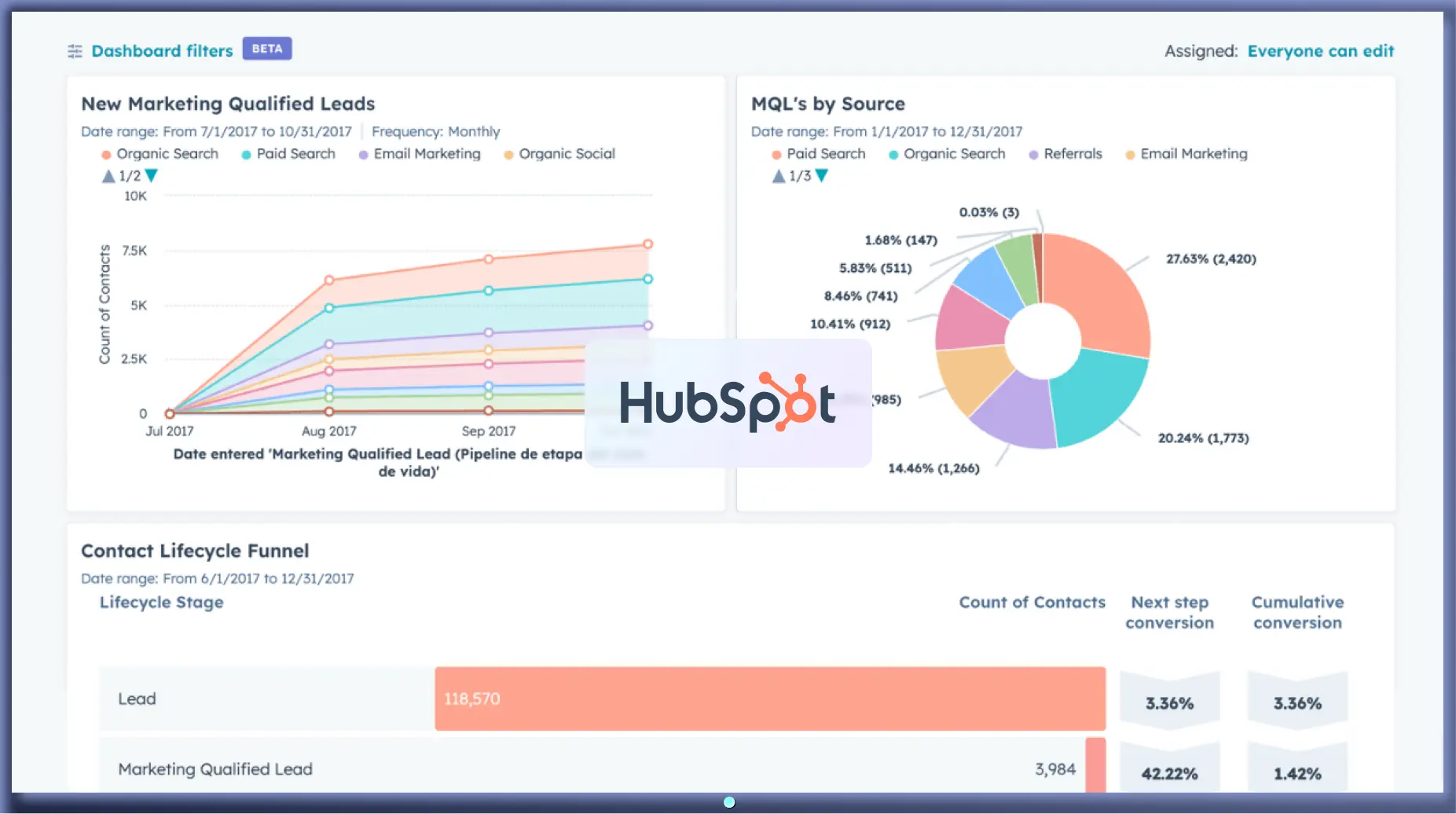HubSpot AI Content Tools: Complete Buyer's Guide
Strategic integration of AI within HubSpot CRM ecosystem
HubSpot AI Content Tools represents a strategic integration of artificial intelligence capabilities within the established HubSpot CRM ecosystem, targeting marketing teams seeking content scalability through customer data-driven personalization.
Market Position & Maturity
Market Standing
HubSpot maintains established market positioning with recognition from TrustRadius for marketing automation [58].
Company Maturity
The company demonstrates strong business maturity indicators through its comprehensive CRM ecosystem and established customer base, particularly among mid-market B2B companies [52][58].
Growth Trajectory
Growth trajectory evidence includes expansion of AI capabilities within the existing platform architecture, though specific funding or revenue growth metrics for the AI content tools component require independent verification.
Industry Recognition
Industry recognition includes positioning within marketing automation categories, though comprehensive ecosystem comparisons remain limited for the specific AI content tools functionality [44][58].
Strategic Partnerships
Strategic partnerships center on the broader HubSpot ecosystem integrations rather than specialized AI content partnerships.
Longevity Assessment
Longevity assessment benefits from HubSpot's established market presence and comprehensive platform approach, providing buyer confidence in continued operation and development.
Proof of Capabilities
Customer Evidence
IEX Group achieved measurable transformation through HubSpot AI Content Tools implementation, demonstrating 50% increase in lead generation and 300% growth in ideal customer profile leads [57].
Quantified Outcomes
Aggregate customer performance data suggests HubSpot customers generate 107% more leads and close 35% more deals compared to pre-implementation baselines [56].
Market Validation
Customer adoption patterns predominantly include mid-market B2B companies, particularly those with existing HubSpot CRM deployments [52][58].
Competitive Wins
Competitive validation emerges through the platform's differentiated approach of embedded AI within CRM ecosystems, enabling content personalization leveraging real-time customer data—a capability absent in standalone tools like Jasper or Copy.ai [53][55].
Reference Customers
Enterprise customer evidence includes recognition from TrustRadius for marketing automation, though specific customer names and detailed case studies require verification through official HubSpot channels [58].
AI Technology
HubSpot's AI functionality centers on content generation integrated with CRM data, enabling personalized email campaigns, blog content creation, and social media posts that leverage customer interaction history [52][53][55].
Architecture
The unified CRM-content architecture represents HubSpot's primary technical differentiator, enabling personalization approaches that may be challenging with disconnected tools [53][55].
Primary Competitors
Primary competitors include specialized AI content platforms like Jasper and Synthesia [9][10][46].
Competitive Advantages
Competitive advantages center on the unified CRM-content architecture enabling sophisticated personalization approaches that may be challenging with disconnected tools [53][55].
Market Positioning
Market positioning focuses on integrated marketing automation rather than standalone content generation, with competitive context showing clear trade-offs between integration benefits and specialized capabilities.
Win/Loss Scenarios
Win scenarios favor organizations with existing HubSpot CRM deployments seeking content workflow integration, where reduced implementation complexity and enhanced data utilization provide competitive advantages [56][57].
Key Features

Pros & Cons
Use Cases
Integrations
Pricing
Featured In Articles
Comprehensive analysis of AI Interactive Content for AI Marketing & Advertising for AI Marketing & Advertising professionals. Expert evaluation of features, pricing, and implementation.
How We Researched This Guide
About This Guide: This comprehensive analysis is based on extensive competitive intelligence and real-world implementation data from leading AI vendors. StayModern updates this guide quarterly to reflect market developments and vendor performance changes.
60+ verified sources per analysis including official documentation, customer reviews, analyst reports, and industry publications.
- • Vendor documentation & whitepapers
- • Customer testimonials & case studies
- • Third-party analyst assessments
- • Industry benchmarking reports
Standardized assessment framework across 8 key dimensions for objective comparison.
- • Technology capabilities & architecture
- • Market position & customer evidence
- • Implementation experience & support
- • Pricing value & competitive position
Research is refreshed every 90 days to capture market changes and new vendor capabilities.
- • New product releases & features
- • Market positioning changes
- • Customer feedback integration
- • Competitive landscape shifts
Every claim is source-linked with direct citations to original materials for verification.
- • Clickable citation links
- • Original source attribution
- • Date stamps for currency
- • Quality score validation
Analysis follows systematic research protocols with consistent evaluation frameworks.
- • Standardized assessment criteria
- • Multi-source verification process
- • Consistent evaluation methodology
- • Quality assurance protocols
Buyer-focused analysis with transparent methodology and factual accuracy commitment.
- • Objective comparative analysis
- • Transparent research methodology
- • Factual accuracy commitment
- • Continuous quality improvement
Quality Commitment: If you find any inaccuracies in our analysis on this page, please contact us at research@staymodern.ai. We're committed to maintaining the highest standards of research integrity and will investigate and correct any issues promptly.